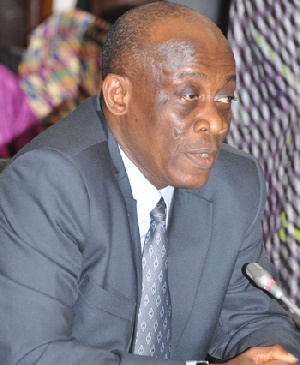Officials of the Ministry of Finance yesterday briefed Members of Parliament on a new programme-based budget for the 2014 financial year intended to improve significantly efficiency, accountability and performance in its implementation.
The ministry’s officials said the new programme-based budget was a new paradigm shift and a complete departure from the traditional activity-based which was excessively centralised and did not allow for monitoring against set objectives and performance indicators.
According to the ministry, the new budget reforms will cost the Ghanaian taxpayer a whopping $1.7 million in its software implementation.
Some members of parliament, however, expressed reservations about the new programme-based budget saying the new approach could not solve Ghana’s myriad of economic problems overnight, if those involved in the implementations, be it politicians or technocrats did not refrain from the ills of corrupt deals and practices.
The National Democratic Congress (NDC) Member of Parliament for Dade Kotopon, Nii Amasah Namoale, questioned why so much could be spent on the software of the new budget stressing further that he suspected the new programme-based was a policy being forced down the throat of the government at a huge cost.
“Mr Speaker, I believe the software expenses of $1.7 million, which would be borne by the Ghanaian taxpayer, is too expensive and we must find out the one who introduced this programme to Ghanaians and the tendering process surrounding the implementation of the software”
The Dade Kotopon MP also wondered whether after educating the parliamentarians, the ministry could force them to accept the new budget reforms saying “Is this new reforms just information you are selling to us or you think you could force parliament to accept this new budget proposals”
The New Patriotic Party (NPP) Member of Parliament for Oda, William Agyapong Quaittoo, also wondered why parliament was not consulted on such key budget reforms before being briefed on its implementation and requested to know how the $1.7 software cost of the new budget reforms was funded by government.
The Minister of Finance, Seth Terpker, admitted that the new budget reform was a World Bank-sponsored programme which was intended to bring more transparency and greater flexibility in using budget resources to achieve policy objectives.
He indicated that the money used for the soft ware of the new budget was part of the e-loan passed by parliament and added that the tendering went through a lot of reviews from $2.4million to $1.7 million cedis.
The chief director of the ministry, Major (rtd) M.S. Tara, for his part, said the programme-based budgeting forms part of the Public Financial Management (PFM) reforms initiated by the government to help improve the PFM systems and processes to ensure effective and efficient service delivery and value for money.
“It is envisaged that this new approach to budgeting will also lead to incremental improvements in our budget management, ensure better resource allocation and enhance the effectiveness and efficiency of public expenditure by linking the funding of public sector organisation to the results they deliver,” the chief director said.
He told the parliamentarians that for the first time in 15 years, performance indicators and targets would be introduced in this year’s budget placing importance on results and performance as against activities and inputs adding ” the programme based budget will define new performance based structure of accountability for ministries, departments and agencies’ work plans as well as serve as the basis for which the MDAs performances would be monitored and evaluated”.
The ranking member of the parliamentary select committee on Finance and NPP MP for Old Tafo, Dr Anthony Akoto Osei, said the new approach to budgeting was not expected to bring any significant change in the economic fortunes of the country.
“Do not raise the expectations of Ghanaians so high as if all of Ghana’s problems are going to be over soon,” he said pointing out that to the best of his knowledge, with these new budget reforms the government has still changed from ‘first gear’ to another ‘first gear’.
The 2014 budget is expected to be presented to parliament by the end of next week.
Business News of Tuesday, 5 November 2013
Source: Daily Guide

















